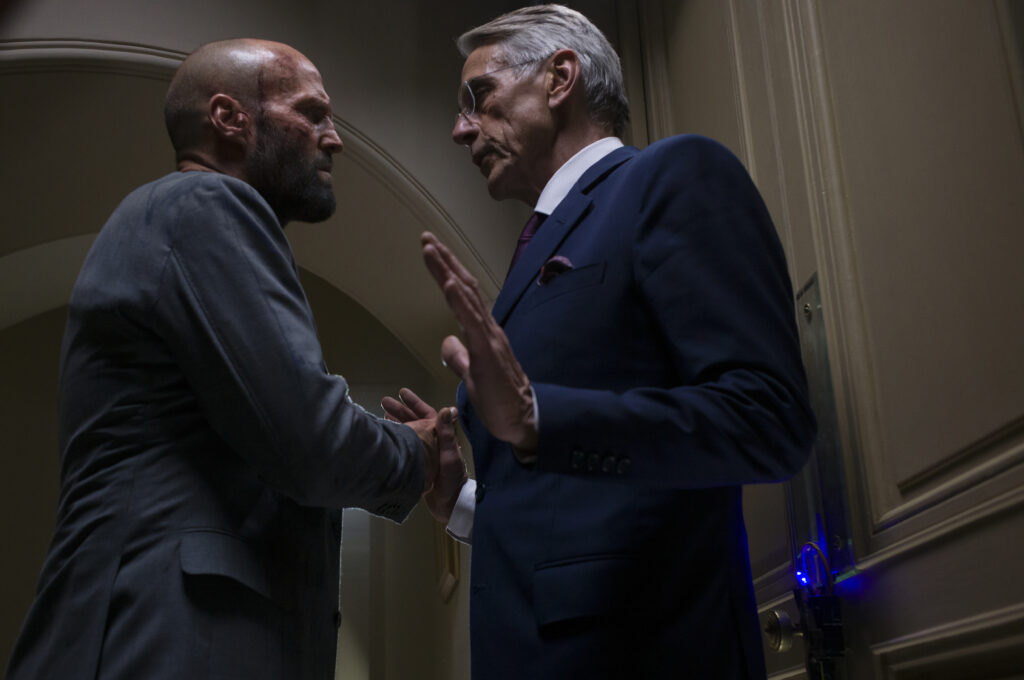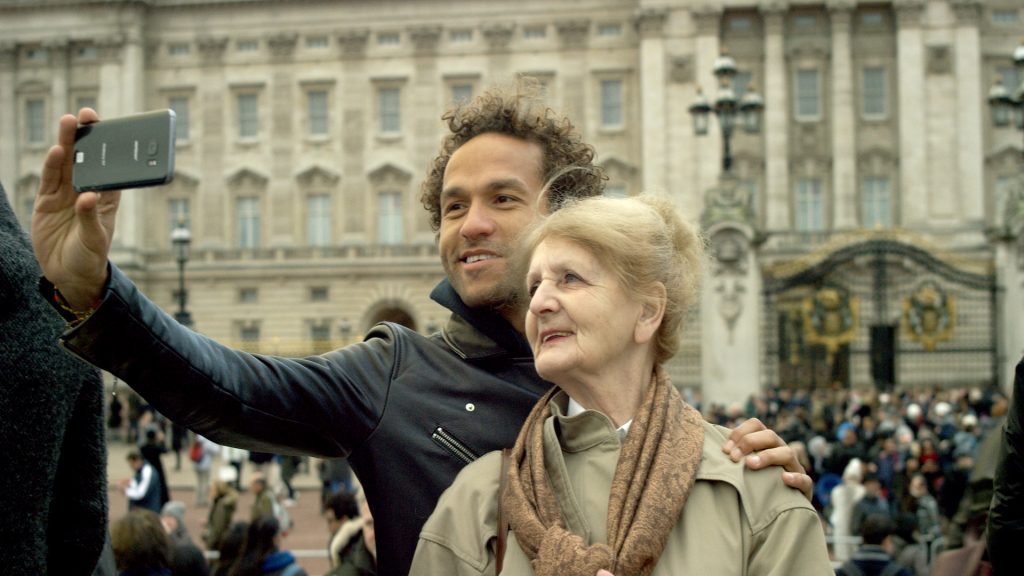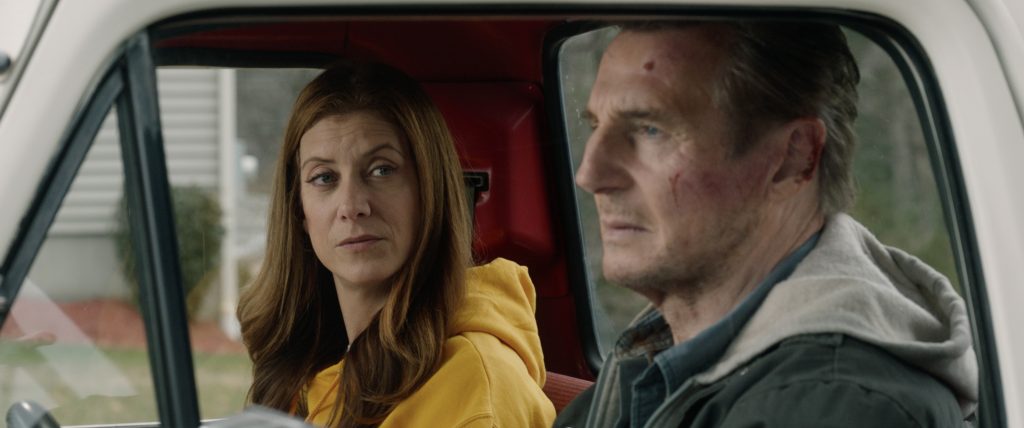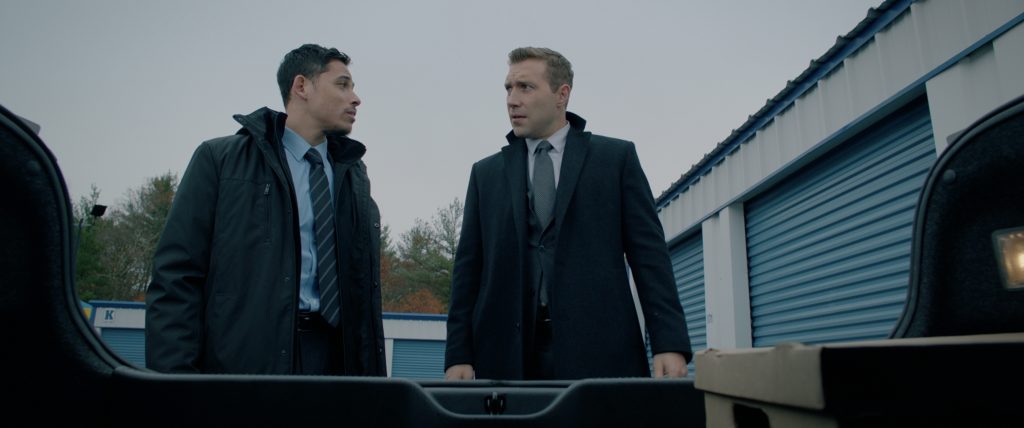January 23, 2024
by Carla Hay

Directed by David Ayer
Culture Representation: Taking place in Boston, the action film “The Beekeeper” features a predominantly white cast of characters (with some African Americans, Latinos and Asians) representing the working-class, middle-class and wealthy.
Culture Clash: A beekeeper with assassin skills goes after the online financial scammers who caused his hive landlord to commit suicide after she lost all of her money to their theft.
Culture Audience: “The Beekeeper” will appeal primarily to people who are fans of Jason Statham and action films that don’t take themselves seriously.

“The Beekeeper” is a slapstick-styled action film that laughs at itself as much as it wants the audience to laugh at the movie. The vigilante beekeeper in the story delivers more cheesiness than honey, but it works well-enough for escapist entertainment. The comedic element saves this movie from being a bottom-of-the-barrel schlockfest.
Directed by David Ayer and written by Kurt Wimmer, “The Beekeeper” begins by showing the movie’s namesake Adam Clay (played by Statham) in the Boston area. He is tending to his bees on a semi-remote ranch owned by a widow named Eloise Parker (played by Phylicia Rashad), who is renting space on her property for Adam to have his bee business. Adam and Eloise have a mutually respectful relationship. Adam is the strong and silent type, but he has a very good rapport with Eloise, who looks out for him as if Adam were her own child.
One day, Eloise is on her laptop computer when she gets an urgent message on her screen saying that her computer has had a security breach and she should call the emergency phone number on the screen. She reaches a call center, where she talks to a slick manager who offers to help Eloise with her problem. What Eloise doesn’t know is that this manager, whose name is Mickey Garnett (played by David Witts), is really the sleazy supervisor of a financial fraud group that makes millions of dollars per month.
At this moment, Mickey is using his phone call with Eloise as a live example in training the call center’s minions, who all know they’re in the business of stealing from victims, especially gullible senior citizens. Eloise admits she’s not very good at using computers, so she lets Mickey walk her through a step-by-step process to let him get access to her computer. During this process, Mickey is smirking and bragging to his trainees about how Eloise is a perfect target.
It isn’t long before Mickey has hacked into all the bank accounts that Eloise has access to, including a community account that has $2 million. The community account is for a children’s charity where Eloise is the director who is a signatory authority. Mickey quickly steals all of the money in Eloise’s personal bank accounts and the community account, through a electronic transfers that she would not be able to trace. Eloise is completely devastated when she finds out what happened.
The next scene shows an FBI agent named Verona Parker (played by Emmy Raver-Lampman) arriving at Eloise’s darkened house and seeing Adam there with a knife. Verona, who doesn’t know who Adam is, immediately gets suspicious and demands to know what he’s doing there. And that’s when Adam and Verona look nearby and see Eloise dead from a gunshot wound and the gun lying next to her on the floor.
Adam is immediately placed under arrest, even though he insists that he had nothing to do with Eloise’s death. He explains that Eloise was his landlord for his beekeeper business and he would have no reason to harm her. It turns out that Verona is Eloise’s daughter, who was visiting to check up on Eloise after not hearing from her for a while.
A coroner’s report officially rules Eloise’s death as a suicide, so Adam is released from jail. Around the same time, Verona and Adam find out that the motive for Eloise’s suicide was that she felt overwhelming guilt and shame for losing not only all of her money but also the charity’s money. And you know what that means: Verona and Adam both want to find the scam leaders and get justice. However, Verona and Adam both have very different definitions of “justice.”
What’s a vigilante like Adam to do in a crass and violent action movie? He find outs the address of the call center and goes there to burn it down, of course. Adam shows up at the glassy office building with two cans of gas and some lighter fluid. Two security guards are there, but that doesn’t stop Adam. Some of this scene is already revealed in “The Beekeeper” trailer.
It’s enough to say that a lot of mayhem and madness ensue, including Adam causing terror in the call center and making the workers chant, “I will never prey on the weak and vulnerable again.” Adam becomes a one-man revenge army who can implausibly taken on several different opponents at the same time. It’s over-the-top ridiculous and hilarious at the same time.
Mickey isn’t the highest-ranking person in the financial fraud group. His boss is the group leader, a spoiled, rich brat named Derek Danforth (played by Josh Hutcherson), who is the heir to a Boston-based corporation called Danforth Enterprises. Derek’s widowed mother Jessica Danforth (played by Jemma Redgrave) is the president of Danforth Enterprises. (“The Beekeeper” was actually filmed in Boston and London.)
Danforth Enterprises has a fixer named Wallace Westwyld (played by Jeremy Irons), a former CIA director who is tasked with looking after Derek and getting him out of trouble. It’s hinted that Wallace and Jessica used to be romantically involved with each other, because Wallace acts almost like a stepfather to Derek. Wallace, who is very intuitive and jaded, is aware that Derek is involved in illegal activities, but Wallace doesn’t really want to hear the details unless he needs to know.
Derek is a habitual troublemaker, so he’s been keeping Wallace busy. And soon, Adam will be keeping Wallace busy too. Meanwhile, Verona is hot on the trail to bring down Derek’s fraud empire, but she’s in a race against time with Adam, who wants to get to Derek and his cronies first. You know how all of this is gong to end.
Why does this beekeeper have such amazing combat skills? That question is answered in the movie. It should come as no surprise that Adam as a big secret. Someone who knows that secret is current CIA director Janet Harward (played by Minnie Driver), who gives this information to certain people.
“The Beekeeper” is the type of movie where Wallace says of the special type of beekeeper that Adam is: “Beekeepers keep working until they die.” Wallace then says that Adam’s goal is to “keep killing until he gets to the top of the hive.” Some of the cast members look like they have a hard time keeping a straight face when saying all of this campy dialogue.
Nothing about “The Beekeeper” is award-worthy, of course, but the movie is very aware of how mindless it is and has fun with it. Unless a viewer is in a very bad mood, that fun is infectious to watch, as long as there are no expectations that “The Beekeeper” will be more than what it is: an uncomplicated, action-packed vigilante rampage.
Amazon MGM Studios released “The Beekeeper” in U.S. cinemas on January 12, 2024.







